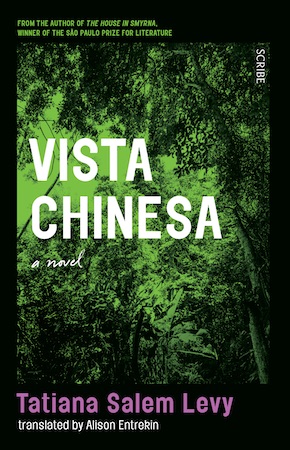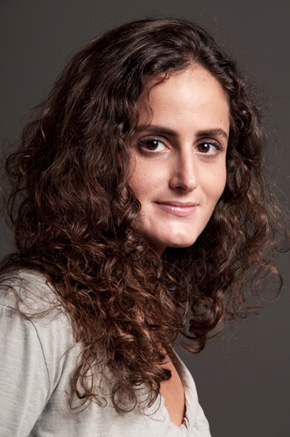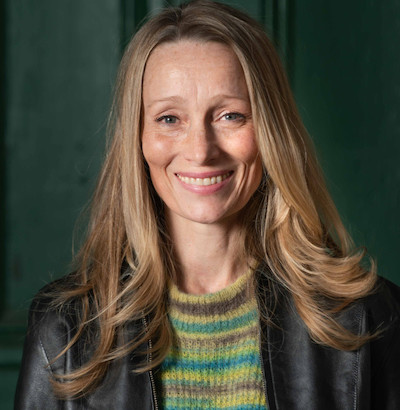Back to that place
by Tatiana Salem Levy
José went in a car with two plainclothes policemen. I went in another with the detective and a muscular man covered in tattoos. The vehicle I was in drove slowly, up the same road that a few days earlier I had travelled up on foot, clothed and intact, and on the way down, torn and broken. It was unbelievable that a simple run before a meeting now obliged me to retrace the route in a police car – civil police, but police nonetheless – trying to identify the exact place where the gloved hands had wrenched me from normality.
I felt like I was in a movie, the victim who exists merely to raise the suspense so that the hero can hunt for the clues that will eventually reward the victim, coming full circle, giving meaning to the initial despair, in this case my despair, the tears that returned as the car moved forward, and the hero, or in this case the heroine, the detective with hair down to her waist, asked me: Was it here?
Not yet, I said, not yet.
Supposedly, there is earnestness on the part of the police. A woman leads the case to foster identification and make me relax. They always ask permission to speak, to come in, and in this manner they keep asking, keep coming in, and before I know it I’m in the car with them. Everything begins to strike me as glaring and obvious, I find myself even more unprotected, I really want to throw myself onto my bed where, alone, I feel less helpless than I do with these police officers beside me. Nothing works, obviously, the earnestness doesn’t work, the realism in excess makes everything unreal, trust me to agree to go ahead with this investigation, we’re in Rio de Janeiro, Brazil, not a Hollywood movie, here there are only loose ends, rough edges, everything’s such a mess that nothing works, there’s no way it can work.
I knew how to identify the exact location, because on the way up to Vista Chinesa there’s an emblematic place, a wall covered in graffiti known as the Wall of Relief, because it’s where the slope becomes less steep and Vista Chinesa is near. Another kilometre and you can already see it. I liked running past this wall, because the graffiti is colourful and creates an optical illusion. The colours get into your head and mix with your thoughts, the music, and the endorphins. A man and woman kissing, a giant mushroom, a psychedelic tree, a whale, a mouth smoking a joint. Whoever drew those things must have been really high: a whale in the middle of the forest, a blue whale, everything so colourful, red, orange, purple, really vivid, eye-catching colours, unlike the forest, which is just green.
The men stayed in the forest, the police officers and my brother. For three hours they scoured the forest, looked for vestiges among dry leaves, branches, almost identical trees, scoured the ground, the soil, the mud.”
It was when the wall ended that the cold metal touched my temple, the blue or black small, medium, or large glove grabbed my arm. I remember seeing the end of the wall, perhaps the man even collided with the wall, perhaps he staggered as he collided with the wall, and me with him. Like in that 4D game that you kids love, the images combining with reality, fiction interacting with what’s real, without your body being able to distinguish the spaces, the stranger dragged me away forcefully, saying incomprehensible words.
The Wall of Relief is on a bend, I said. It was at that bend. As soon as I pointed at the place, I felt the nausea coming on and asked to be taken home.
The detective came with me, asked if I was well, and asked for a glass of water. It was hot, that muggy, humid heat, the city’s typical sultriness. The men stayed in the forest, the police officers and my brother. For three hours they scoured the forest, looked for vestiges among dry leaves, branches, almost identical trees, scoured the ground, the soil, the mud. Maybe a monkey, a toucan, or a five-metre-long boa constrictor weighing forty kilos had eaten the traces left there, the traces that they were looking for, a piece of his clothing, a piece of his glove, a strand of hair, but all they found were my trainers, the trainers I thought he’d taken to delay my encounter with the asphalt: wait fifteen minutes and go, and I felt the weight of the cold gun the entire time, the minutes or hours that I spent lost in the forest, before feeling my bare feet on the soft asphalt once again.
From Vista Chinesa, translated by Alison Entrekin (Scribe, £8.99)
—
Author’s note
In 2014, a friend I call a sister was raped while running to Vista Chinesa. A long police investigation to find the perpetrator ensued. I wasn’t in Brazil at the time, and was only able to stay abreast of this painful process by telephone, which was the closest form of contact available to me.
At an exhibition a few months later, in early 2015, I saw the series The Innocents by American photographer Taryn Simon, which documents a number of cases of wrongful conviction in the United States, raising the question of photography’s function as credible evidence. The portraits of people who had been wrongfully convicted based on identification by victims reminded me of my friend’s rape and the search for the perpetrator. Her difficulty in establishing whether a suspect was or wasn’t the culprit, her reticence to incriminate an innocent man,
the police’s determination to arrest someone – I couldn’t stop thinking about it. That was when I began taking notes to write a novel.
I set the notes aside until the beginning of 2018, when I discovered I was pregnant with a girl, and I thought the time had come to turn them into a book. In order to do so I needed to interview my friend, but I wasn’t sure if she would be willing to re-open such deep wounds. The feminist movement had since given her opportunities to talk about the subject, but she had preferred to keep her story among a close circle of people.
I made it clear that I was going to write a novel, and she never interfered with my choice. At a certain point in the process, she asked me only to say that it was a novel based on true events.”
As soon as we began a series of interviews, I was surprised by the urgency with which she narrated the experience. The wounds weren’t just deep – they were at the surface, on her skin, still very much open and raw. She became so involved in the process that it would have been impossible to interrupt it in the middle. For a time, we established the following routine: she would tell me the story and I would take notes; then I would write, and she would read what I’d written; she would comment on it, and I would revise it. When I felt I had what I needed, I would move on.
I made it clear that I was going to write a novel, and she never interfered with my choice. She never asked me to tell it this way or that way. At a certain point in the process, she asked me only to say that it was a novel based on true events.
When the book was ready, she came to the conclusion that it wasn’t enough to merely set forth the facts. She felt it was important to reveal to whom those facts belonged. Would you like me to name you? I asked. Yes, she replied. For months, I played the Devil’s advocate, trying to ascertain that it was what she really wanted, until the day she told me: I’m not ashamed of what happened. I want you to write that this really happened – and that it happened to me, Joana Jabace.
—

Tatiana Salem Levy is a writer, essayist, and researcher at Universidade Nova de Lisboa. Her first novel, The House in Smyrna (also published by Scribe and translated by Alison Entrekin), won Brazil’s most generous literary award – the São Paulo Prize for Literature – for a debut work. She lives in Lisbon, and is a columnist for the newspaper Valor Econômico. Vista Chinesa is published by Scribe in paperback and eBook.
Read more
mertinwitt-litag: Tatiana Salem Levy
@levysalem
@ScribeUKbooks

Alison Entrekin has translated over forty books from the Portuguese, including the classics City of God by Paulo Lins, Near to the Wild Heart by Clarice Lispector and My Sweet Orange Tree by José Mauro de Vasconcelos. In 2019 she was awarded the New South Wales Premier’s Translation Prize and PEN medallion for the body of her work. Other honours include shortlistings for the 2004 Independent Foreign Fiction Prize, the 2012 IMPAC Dublin Literary Award and the 2013 PEN America Translation Prize.
alisonentrekin.com

